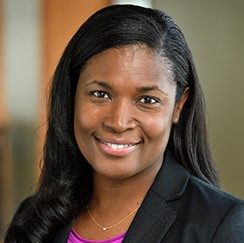I’m feeling confused by all the information out there. How is COVID-related PTSD different from other forms of PTSD? In this video, Dr. Rodney answers your questions about mental health treatment.
Tamar Rodney, PhD, PMHNP-BC, CNE is an assistant professor at Johns Hopkins School of Nursing. Her research and clinical work focus primarily on improving PTSD diagnosis and treatment.
Read this article, featuring Dr. Rodney, about COVID-related PSTD.
For information about treatments for PTSD please visit The Treatment Hub.
Hi. I’m Dr. Tamar Rodney, and I’m a psych mental health nurse practitioner. And our question is: “I’m feeling confused by all the information out there. How is COVID-related PTSD different from other forms of PTSD?”
And I want to say thank you for asking this question because it’s a question that’s relevant to all of us. And the first part is this feeling of confusion about all the information out there. Absolutely. We have been going through this for more than 18 months, and in that process, we’ve been processing lots of new information that we’ve never heard of and that we’re desperately trying to make sense of.
One of the things that is overarching for COVID and how it’s been experienced is asking ourselves was it or is it a traumatic event, and the answer is yes. And what makes it a little bit different from other forms of PTSD is that it’s been a recurring event, an event that we weren’t quite prepared for. So, what I’m hoping is that what we know about PTSD, experienced as a single event, it’s happening to others, learning that it’s happening to other individuals.
But the different version of this, and I think very meaningful, is that we need to recognize that this has been happening multiple times. And by multiple times, I want to just put this in context of time that there was a time that we did not know what we were dealing with, and the fear of not knowing is in itself a traumatic experience. Then we got into a piece where there were events that we were going through that we weren’t quite prepared for nor did we want, and we didn’t have a template of how to deal with it.
And I’ll put in an example here to say that one of the things that was protective or suggested as protective for us is to socially and physically isolate ourselves from others as a protective mechanism, the exact opposite of what we would do when we’re going through something difficult. So, in many ways, the very things that would heal us in a traumatic event is what we have been asked not to do, which in a sense cause trauma for us.
Continuum of this has been variable for individuals, but one of the things we also have to recognize is that many individuals have died from COVID, and there is that trauma related to it of their surviving family members. And so, one of the qualifying pieces for trauma and PTSD is learning that something is happening to someone else or witnessing it happening to others. And not only are we witnessing it on a family individual level, but also on a global level. We hear the numbers.
So, how do we cope with all this information out there because it’s still going on is to say try to get it from reputable sources, sources that are valid, well-researched, and then try to limit the consumption of this information. We will all be way more informed than we were before and hopefully never have to deal with this again, but we will have a better blueprint of how to deal with traumatic situations like COVID.
And 18 months in, it’s not over yet. So, we still want to recognize that there are some residual trauma that we’re still dealing with, but we have a template of traditionally how PTSD is covered and how COVID could also be seen in that similar context and using some of that knowledge to cope with it as a traumatic event. So, an excellent question, and I so appreciate you asking it. I’m hoping that as we go through this process, we will also use some of those lessons to cope with the feelings of trauma that can be uniquely related to COVID.
BrainLine is powered in part by Wounded Warrior Project to honor and empower post-9/11 injured service members, veterans, and their families.
About the author: Tamar Rodney, PhD, PMHNP-BC, CNE
Tamar Rodney, PhD, PMHNP-BC, CNE is an assistant professor at Johns Hopkins School of Nursing. Her research and clinical work focus primarily on improving PTSD diagnosis and treatment.

